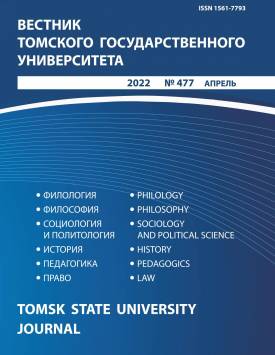On laws governing the transformation of modern constitutional law in Russia and reasons for their classification
The relevance of the presented research is due to the fact that the knowledge of the laws of evolution of constitutional law and their conscious use contribute to the preservation of the constitutional characteristics of the state, its constitutional identity, dissimilarity with others, which is especially important in the period of development and rapid changes in the field of international cooperation, strengthening of the universalization of constitutional and legal norms. In addition, questions concerning the clarification of the origins of the transformation of the legal system of Russia make it possible for state studies to foresee the potential of its evolution and to identify the elements and essential content of the term “constitutional identity”. The aim of this research is to reveal the basic regularities in constitutional law, clarify the essence of this term, and attempt to classify these regularities. The theoretical basis of the research was formed by the works of E.S. Anichkin, L.V. Butko, Yu.Yu. Vetyutnev, S.N. Ovchinnikov, Yu.A. Tikhomirov, Yu. Yu. Shturtsev, who certainly made a great contribution to the development of the problem of patterns in law and constitutional law, in particular. The main research methods were: dialectical, with the help of which the content of the category “regularity in constitutional law” in its formation and development was analyzed; formal logical, which helped clarify and generalize the opinions of authors of different periods on the issue of manifestation of patterns in state studies; formal legal and comparative legal, which helped clarify the successive and received provisions in the Constitution of the Russian Federation. In the course of the study, the author revealed that the patterns had been studied earlier, but an integrated approach to this issue was not presented. She also found that various scientists, when conducting specific studies, identified as patterns in constitutional law the following: continuity, reception, universalization and subsequent internationalization, cyclicity, change in the subject of constitutional law; each pattern is consistently described in the article. As a result, the author offers her own definition of the concept “regularity in constitutional law” - it is a repeated process and phenomenon, accompanied by interdependent facts, arising on the basis of constitutional legal norms; consistently considers the possibilities of its manifestation and offers her own approach to classifying this phenomenon on different bases: for example, by occurrence, by the subject.
Keywords
constitutional originality, constitutional identity, reception, continuity, constitutional law, universalization, internationalization, patterns in law, patterns in constitutional law, evolution of constitutional lawAuthors
| Name | Organization | |
| Ryakhovskaya Tatyana I. | Siberian Institute of Management, Branch of the Russian Presidential Academy of National Economy and Public Administration | dnight@mail.ru |
References

On laws governing the transformation of modern constitutional law in Russia and reasons for their classification | Vestnik Tomskogo gosudarstvennogo universiteta – Tomsk State University Journal. 2022. № 477. DOI: 10.17223/15617793/477/29
